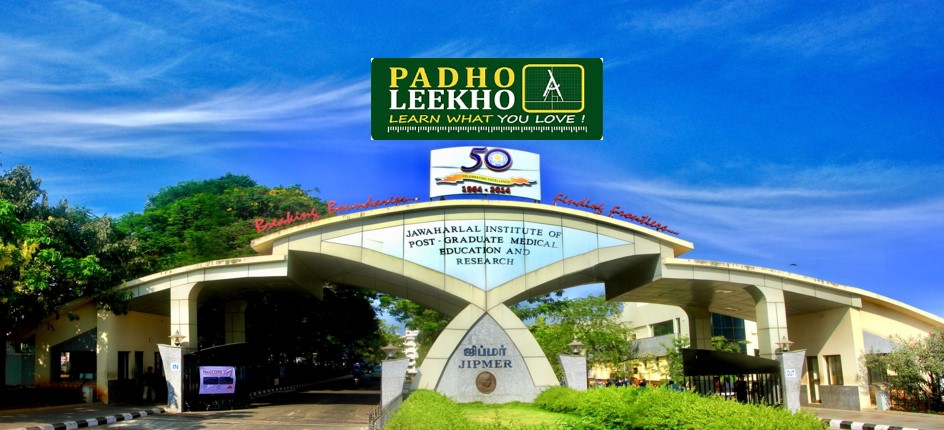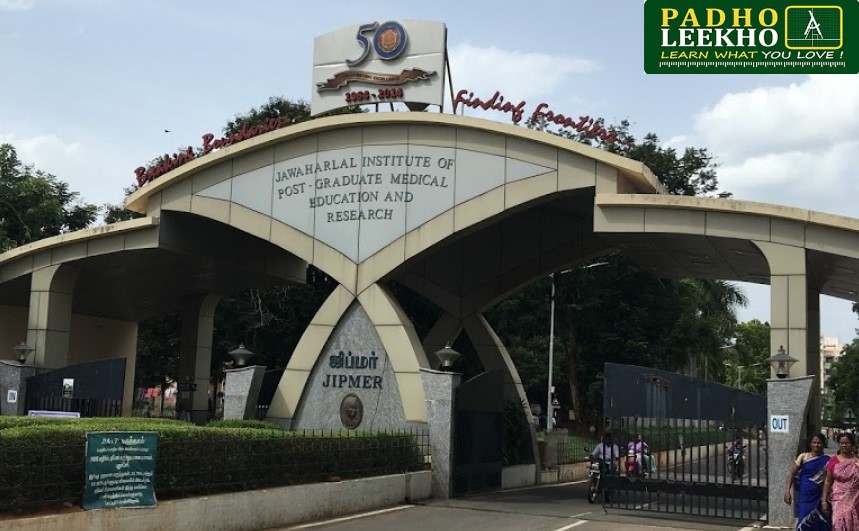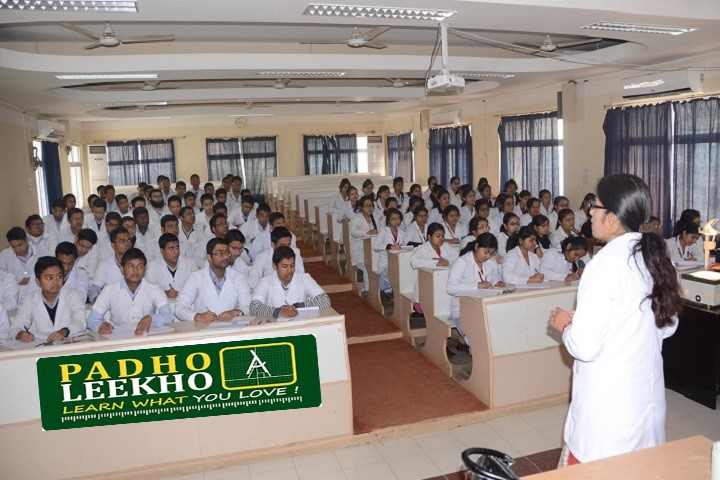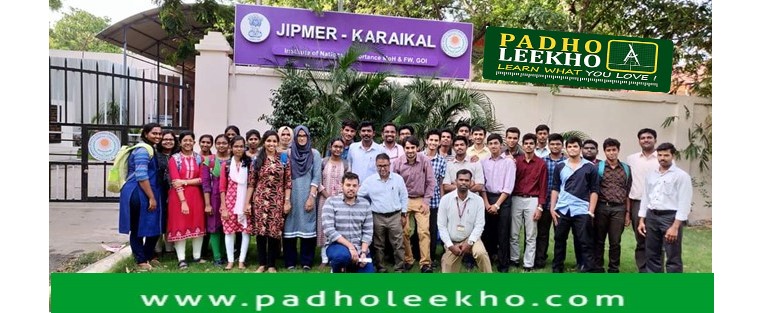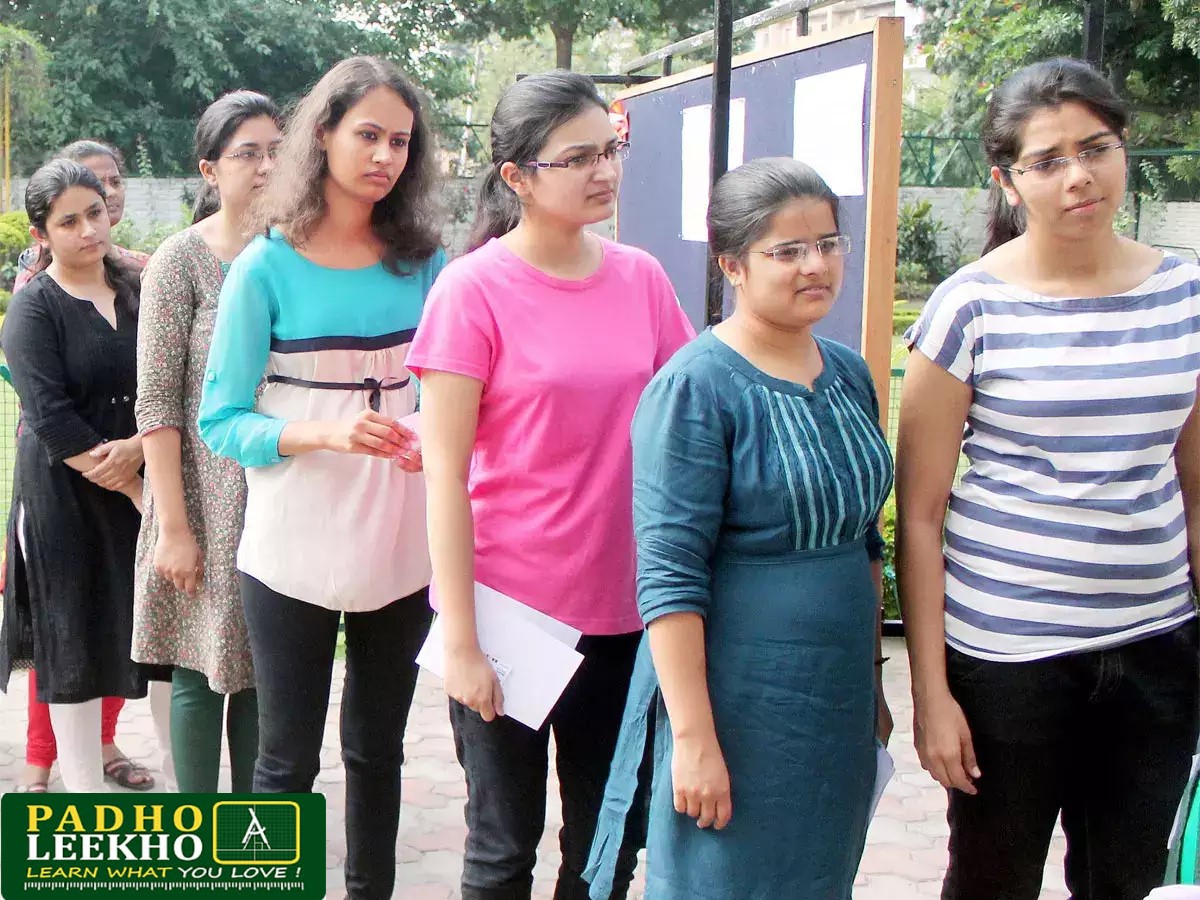About JIPMER
Know About MBBS Courses By JIPMER
Jawaharlal Institute of Postgraduate Medical Education and Research (JIPMER) can trace its origins to the ‘Ecole de Medicine de Pondicherry’ established by the French Government in 1823.
Unlock Exclusive Access To JIPMER Course Materials.
Courses Offered For JIPMER By Padho Leekho
In 1956 foundation for new medical college was laid and in 1964, hospital was inaugurated.
JIPMER became an institution of national importance under the Ministry of Health and Family Welfare, Government of India in the year 2008. It is an institution established for teaching, research and patient care in the area of health.
JIPMER spreads over 192 acres. The institution houses one administrative block, one academic Centre, one nursing college, seven hospital blocks, seven accessory services buildings and four residential complexes. 12 broad types of medical, nursing and allied health science courses covering all disciplines in healthcare from basic to super specialty training are conducted.
JIPMER is one among the very few institutions in the country which is providing teaching from undergraduate to super specialty & sub-specialties, conducting path breaking research and providing specialty care of high order.
The model of providing free specialty health care while maintaining quality and safety makes JIPMER a unique model in the country.
JIPMER’s success in providing best treatment even to the least affordable in the society makes it a model of specialty care delivery of the future. JIPMER continues to rank among the top best five medical schools in the country.
JIPMER is witnessing expansion in the form of new campuses like JIPMER Karaikkal, JIPMER outreach Centre at Yanam apart from the soon to be commissioned screening OPD block and superspeciality extension block. Conceptual plans for Puducherry second campus for Institute of organ transplantation and Institute of advanced trauma and rehabilitation were initiated during this period.
ENROLL For Best JIPMER Exam Test Series By Padho Leekho
History & Milestones
Jawaharlal Institute of Postgraduate Medical Education and Research (JIPMER) can trace its origins to the ‘Ecole de Medicine de Pondicherry’ established by the French Government in 1823.
 The college was located in the modified buildings of the High Court, which is now the Legislative Assembly Hall.
The college was located in the modified buildings of the High Court, which is now the Legislative Assembly Hall.
In 1956, The Ambassador of France laid the foundation stone of our ‘new’ medical college that was located on the outskirts of Pondicherry town.
In the wake of the ‘de facto’ transfer of Pondicherry to the Government of India, the college was briefly named Dhanvantri Medical College, before being upgraded to a Regional Postgraduate Centre under the Ministry of Health and Family Welfare (DGHS), Government of India and renamed JIPMER.
The then President of India Dr. S. Radhakrishnan inaugurated the hospital and the outpatient buildings on 13 July 1964.
In July 2008, JIPMER was given the status of an Institution of National Importance by an Act of Parliament, on the lines of All India Institute of Medical Sciences, New Delhi and Postgraduate Institute of Medical Education and Research, Chandigarh. The increase in financial outlay has been translated into an all-round development of the institution with an increase in the number of staff, students, and services.
On 15 October 2008, the former President of India, Dr. A. P. J. Abdul Kalam along with Dr. Anbumani Ramadoss inaugurated the super-specialty block, the trauma care center, and the auditorium and dedicated JIPMER to the nation as an institution of national importance.
The present expansion of JIPMER (Phase II) has seen the development of the JIPMER Women and Children’s Hospital, the JIPMER Academic Centre, the new hostel complex for undergraduates and postgraduates and a common wellness center including a gymnasium, dining hall and other amenities.
JIPMER Exam Pattern
|
Conducting Body |
JIPMER MBBS replaced by NEET, conducted by NTA |
|
Mode of Exam |
Offline |
|
Exam Language |
English Language |
|
Duration of JIPMER 2023 Exam |
2 hours and 30 minutes |
|
Type of Questions |
MCQ or Multiple-Choice Questions |
|
Total Number of Questions |
200 |
|
Sections |
3 Subjects |
|
Basic Admission Criteria |
Merit-based and Entrance Test |
|
Application Mode |
Online |
JOIN For Best Courses of JIPMER Exam
Distribution of Questions
JIPMER 2023 Exam Pattern contains the total number of 200 questions that covers five sections such as Physics, Chemistry, Biology, Logic and Quantitative Reasoning, English and Comprehension. Section-wise number of the question is given below in a table.
|
Section |
Number of Question |
|---|---|
|
Physics |
60 |
|
Chemistry |
60 |
|
Biology |
60 |
|
Logic and Quantitative Reasoning |
10 |
|
English and Comprehension |
10 |
|
Total |
200 |
Courses Offered By JIPMER
Marking scheme for JIPMER
It is also one of the most important parts for JIPMER 2023 Exam Pattern. Some of the important points are given below.
- There will be one marks given for each positive answer and one marks will be deducted for each negative answer.
- There will not be given any marks for any type of unattempt questions and also there won’t be any deduction for these questions.
- Percentile score will be calculated based on the raw score.
- The percentile score will be given for deciding the eligibility criteria that uses Cut-off score and preparing for merit rank.
- For the MBBS entrance, minimum eligibility marks will be 50% in aggregate for general category and 40% in aggregate for a reserved category like SC/ST candidates.
|
Type of Question |
Marking Pattern |
|---|---|
|
Correct Answer |
+4 |
|
Wrong Answer |
-1 |
|
All for analysis |
0 |
|
For any un-attempted question |
0 |
JIPMER Exam Syllabus
The questions for JIPMER are based on the syllabus as prescribed by State Board Hr. Sec. and CBSE for XI & XII Standards. That is, It will cover topics from Physics, Chemistry, Biology studied in class 11 and class 12. The conducting body will not add anything to this syllabus. Subject-wise syllabus of entrance exam is given in tables below:
Physics Syllabus
The topics covered under the Physics section are based on Class 11 and Class 12 syllabus:
| Optic Ray | Wave Motion |
| Heat and Thermodynamics | Solids and semi-conductor Devices |
| Magnetic Effect of Current and Magnetism | Laws of Motion |
| Gravitation | X-Rays |
| Electrostatics | Modern Physics: (Atomic Models) & Current Electricity |
Chemistry Syllabus
candidates preparing for JIPMER MBBS exam will have to go through topics studied in higher secondary education.
| Alkenes and Alkynes | General Organic Chemistry |
| General Organic Chemistry | Chemical Equilibrium |
| Alkanes | p-block Elements |
| s-block Elements | Chemical Bonding |
| Chemical Thermodynamics | Mole Concepts |
| Transition Elements (d and f Block) and Electrochemistry | |
Biology Syllabus
Biology syllabus comprises of topics prepared for 10+2 examinations.
| Genetics | Ecology |
| Human Health Diseases | Origin of Life |
| Cell | Plant Morpho |
| Plantae | Cell Division |
| Mineral Nutrients | Cell Respiration |
| Plant water relation | Photosynthesis |
English Syllabus
- Section A: Reading Unseen Passages and Note-making
- Section B: Writing Skills
- Section C: Literature and Long Reading Text
- Some of the questions will be based on synonyms, antonyms and vocabulary
Logic and Quantitative Reasoning
As for Logic and Quantitative Reasoning there is no set syllabus. However, candidates can expect questions from the following areas:
- Analogy test
- Logical deduction
- Figure formation and analysis
- Figure matrix, etc.


